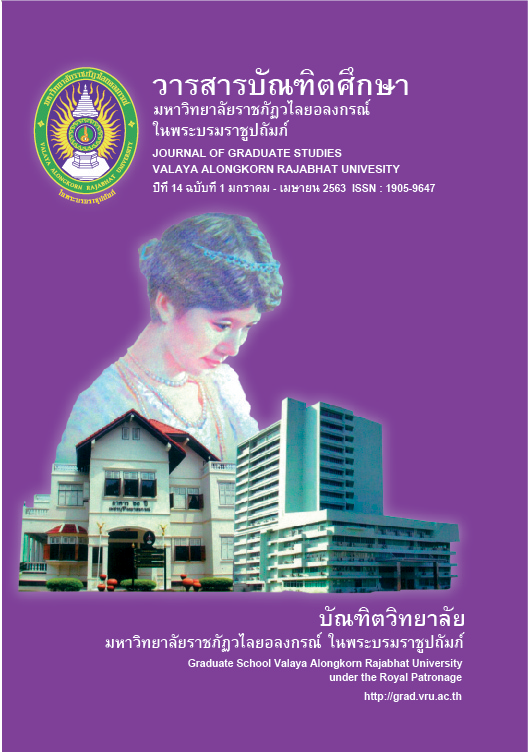FACTORS AFFECTING EFFICIENCY OF STEM EDUCATION LEARNING MANAGEMENT OF TEACHERS TO THE UNDER DEPARTMENT OF LOCAL ADMINISTRATION IN PATHUM THANI PROVINCE
Main Article Content
Abstract
The objectives of this research were to study: 1) the efficiency of STEM education learning management of teachers under the Department of Local Administration in Pathum Thani province, 2) the factors related to the efficiency of STEM education learning management of teachers under the Department of Local Administration in Pathum Thani province, and 3) the factors affecting the efficiency of STEM education learning management of teachers under the Department of Local Administration in Pathum Thani province. The samples of the study drawn from multi-stage sampling consisted of 327 teachers and administrators of primary schools under the Department of Local Administration in Pathum Thani province. The research instrument used for collecting data was a five-point Likert scale questionnaire. The reliability of the questionnaire was 0.95. The data were analyzed using mean, standard deviation, and multiple regression analysis - the enter method.
The results of the research showed that: 1) the efficiency of STEM education learning management of teachers was at a high level, 2) the factors related to the efficiency of STEM education learning management of teachers were at a high level. When the individual factors were considered, innovation media and technology, scientific attitude, classroom atmosphere, and personality were the first, second, third, and fourth averages in the efficiency respectively, and 3) the factors affecting the efficiency of STEM education learning management of teachers were innovation media and technology, scientific attitude, personality, and classroom atmosphere. These factors could significantly predict the efficacy with 79.7 percent at the 0.05 level.
Article Details

This work is licensed under a Creative Commons Attribution-NonCommercial-NoDerivatives 4.0 International License.
บทความทุกเรื่องได้รับการตรวจความถูกต้องทางวิชาการโดยผู้ทรงคุณวุฒิ ทรรศนะและข้อคิดเห็นในบทความ Journal of Global of Perspectives in Humanities and Social Sciences (J-GPHSS) มิใช่เป็นทรรศนะและความคิดของผู้จัดทำจึงมิใช่ความรับผิดชอบของบัณฑิตวิทยาลัย มหาวิทยาลัยราชภัฏวไลยอลงกรณ์ ในพระบรมราชูปถัมภ์ กองบรรณาธิการไม่สงวนสิทธิ์การคัดลอก แต่ให้อ้างอิงแหล่งที่มา
References
Bender, W. N. (2012). Project Based Learning: Differentiating Instruction for the 21st Century. Thousand Oaks: CA: Corwin Press.
Best, J. W. (1993). Research in Education. Boston, M.A.: Allyn and Bacon. p.247.
Boonniti, P. (2016). sarup banyākāt nai chan rīan [Summary of classroom atmosphere]. Bangkok: Watana Panit Publishing Co.Ltd.
Brown, R., & Merrill, C. (2011). Science and technology educators’ enacted curriculum: Areas of possible collaboration for an integrative STEM approach in public schools. Technology & Engineering Teacher.
Dachakub, P. & Meesri, R. (2013). kānsō̜n khit dūai khrōng ngān : kān rīan kānsō̜n bǣp būranākān [Teaching Thinking through Projects: Integrated Teaching]. Bangkok: CU Printing House.
Fan. (2011). International Views of STEM Education. Retrieved from: http://www.iteea.org/Conference/PATT/PATT28/Fan%20Ritz.pdf.
Hinkle, D. E, William, W. and Stephen G. J. (1998). Applied Statistics for the Behavior Sciences. 4thed. New York: Houghton Mifflin. p.120.
Hutsanakin, P. (2012). lakkān bō̜rihān rōngrīan [School management principles]. Bangkok: Watana Panit Publishing Co.Ltd.
Kanjanawasi, S. et al. (2008). kānlư̄ak chai sathiti thī mo̜som samrap kānwičhai [Choosing the right statistics For research] 5th Bangkok: CU Printing House.
Keawsri, A. et al. (2015). patčhai thī song phon tō̜ prasitthiphāp kānsō̜n khō̜ng khrū phū sō̜n laksūt prakāsanīyabat wichāchīp nai rōngrīan matthayommasưksā sangkat samnakngān khēt phư̄nthī kānsưksā matthayommasưksā khēt sāmsipsō̜ng [Factors Affecting Teaching Efficiency of Certificates Course in secondary School under Secondary Educational Service Area Office 32]. Journal of Burirum Rajabhat University, 10(2), 57-66.
Klomim, K. (2014). kānčhatkān rīanrū bǣp būranākān satem sưksā samrap naksưksā wichāchīp khrū [Learning Management Based on Stem Education for Student Teachers]. Journal of Education Naresuan University, 18(4), 334-348.
Makkasaman, W. (2011). kānsō̜n bǣp khrōngkān [Project Teaching]. Bangkok: CU Printing House.
Moursund, D. (2009). Project-Based Learning: Using Information Technology. New Delhi: Vinod Vasishtha for Viva Books Private limited.
Nilawan, K. (2015). patčhai thī mī phon tō̜ kānphatthanā khrū nai kānčhatkān rīan kānsō̜n nawattakam læ theknōlōyī kānsưksā sū satawat thī yīsipʻet [Factors affecting teacher development in instructional management Innovation and educational technology towards the 21st century]. Thesis Doctor of Education, Suan Sunandha Rajabhat University.
Phukeat, L. (2009). kānsō̜n bǣp khrōng ngān læ kānsō̜n bǣp chai wičhai pen thān: ngān thī khrū prathom thamdai [Project-based teaching and research-based teaching: Work that elementary school teachers can do]. Bangkok: Saha & Sons Printing Co Ltd.
Sawangpop, S. et al. (2015). patčhai thī samphan kap prasitthiphāp kānsō̜n khō̜ng khrū klum sāra kān rīanrū khanittasāt chūang chan thī sām čhangwat sīsakēt [The Factors Related to Teaching Efficiency of Class interval 3 Mathematics Teachers in Si Sa Ket]. Master of Education Thesis Candidate in Educational Research, Faculty of Education, Mahasarakham University.
Sukko, T. (2013). kānphatthanā samatthana khrū nai satawat thī yīsipʻet [The development of teacher competencies in the 21st century]. Bangkok: CU Printing House.
The Institute for the Promotion of Teaching Science and Technology. (2016). kānčhatkān rīanrū bǣp sa tem sưksā [Management of STEM Education]. Bangkok: Council Printing House.


